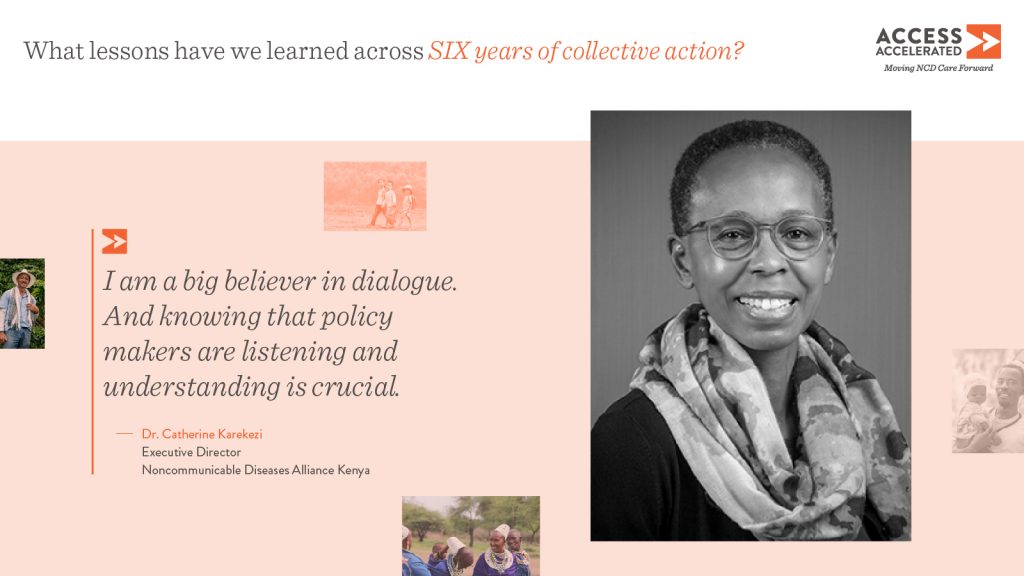The Noncommunicable Diseases Alliance Kenya (NCDAK) unites organizations led by persons living with noncommunicable diseases (NCDs), NGOs, and professional associations to advocate for and support individuals living with or at risk of NCDs in Kenya. Dr. Catherine Karekezi, the organization’s Executive Director, is passionate about involving individuals living with NCDs in advocacy efforts across the country, as well as partnering with the Ministry of Health to create a greater ripple effect and to continually push the NCD agenda forward.

A DIALOGUE-BASED ADVOCACY EFFORT
As a firm believer in the power of dialogue, one of our first major projects was a dialogue-based advocacy initiative as part of NCDAK’s contribution to the Global Advocacy Agenda of People Living with NCDs. Through support from NCD Alliance, the Advocacy Agenda of People Living with NCDs in Kenya was also developed through this initiative. Through a number of forums, the Advocacy Agenda of People Living with NCDs in Kenya has provided persons living with NCDs with a platform to share their views and experiences with healthcare providers, policymakers, and the public, allowing them to articulate their advocacy requests in their own words.
It has been an enormously transformative experience, not only for people living with NCDs, it has given policymakers a rare and unique opportunity to gain a firsthand understanding of the lived experience and challenges faced by people living with NCDs.
PUTTING PEOPLE AT THE HEART OF ADVOCACY
One of the initial hurdles that we faced was the reluctance of many people living with NCDs to share their personal experiences. Much of it was to do with the prevalent stigma associated with NCDs. In many cases, the individuals that we invited to speak had not discussed their condition with their family members and friends. However, through this project, we are starting to see that change.
People living with NCDs are recognizing that their voices could not only help others struggling with similar issues, but by sharing their stories with policymakers, they can help improve the prioritization and delivery of NCD care throughout the country. For me, one of the biggest takeaways from the project is the power of giving a voice to people living with NCDs. Being patient focused has made a huge difference to the level of awareness and understanding of how we deliver care and support.
BUILDING CAPACITY TO DRIVE CHANGE
At the same time, the project has provided advocacy training to ensure that advocates have the skills to communicate and collaborate with policymakers. The training has equipped them with knowledge of critical areas such as public expenditure management, public participation, and social accountability, and has enabled them to draft policy requests and proposals. This has led to the allocation of healthcare budgets to NCDs at the county level in some areas, which is a remarkable achievement.
STRENGTHENING PARTNERSHIPS
Today, NCDAK enjoys an open-door policy with the Kenyan Ministry of Health. Our relationship has continued to strengthen, allowing for continued support on various initiatives.
For example, through hosting joint initiative stakeholder forums, we have been able to engage with policymakers. In 2022, four years after the first forum that we held, the National Ministry of Health endorsed the Global Charter of the Meaningful Involvement of Persons Living with NCDs. This was an incredible milestone and is helping us to expand our impact and drive our advocacy efforts forward.
LOOKING FORWARD
One way that we are expanding our work and its impact is through those who have completed the advocacy training. They are committed to helping and training others, which has allowed us to empower additional lived experience advocates and ensure the longevity of our commitment.
In the future, we want to continue this work and make advocacy for people living with NCDs a standard practice in our other projects. We plan to consolidate social accountability tracking to better monitor the government’s response to the NCD burden and related initiatives. Overall, we are using the lessons we have learned to accelerate progress and set a standard for moving forward.
Read more interviews in the Access Accelerated report: Key Lessons in Advancing Access to NCD care.